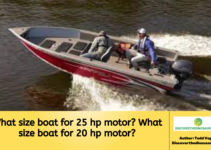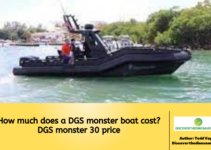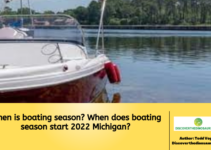It’s a common misconception that it’s illegal to have headlights on a boat. In reality, there is no law prohibiting their use. While they may not be required by law, headlights can be a great safety tool when boating at night.
Here we’ll explore the benefits of using headlights while boating and offer some tips for doing so safely.
Reading this article, Todd Vogel will answer you the question “Is it legal to have headlights on a boat? Why don’t ships have headlights?” and more relevant information. Let’s find out together!
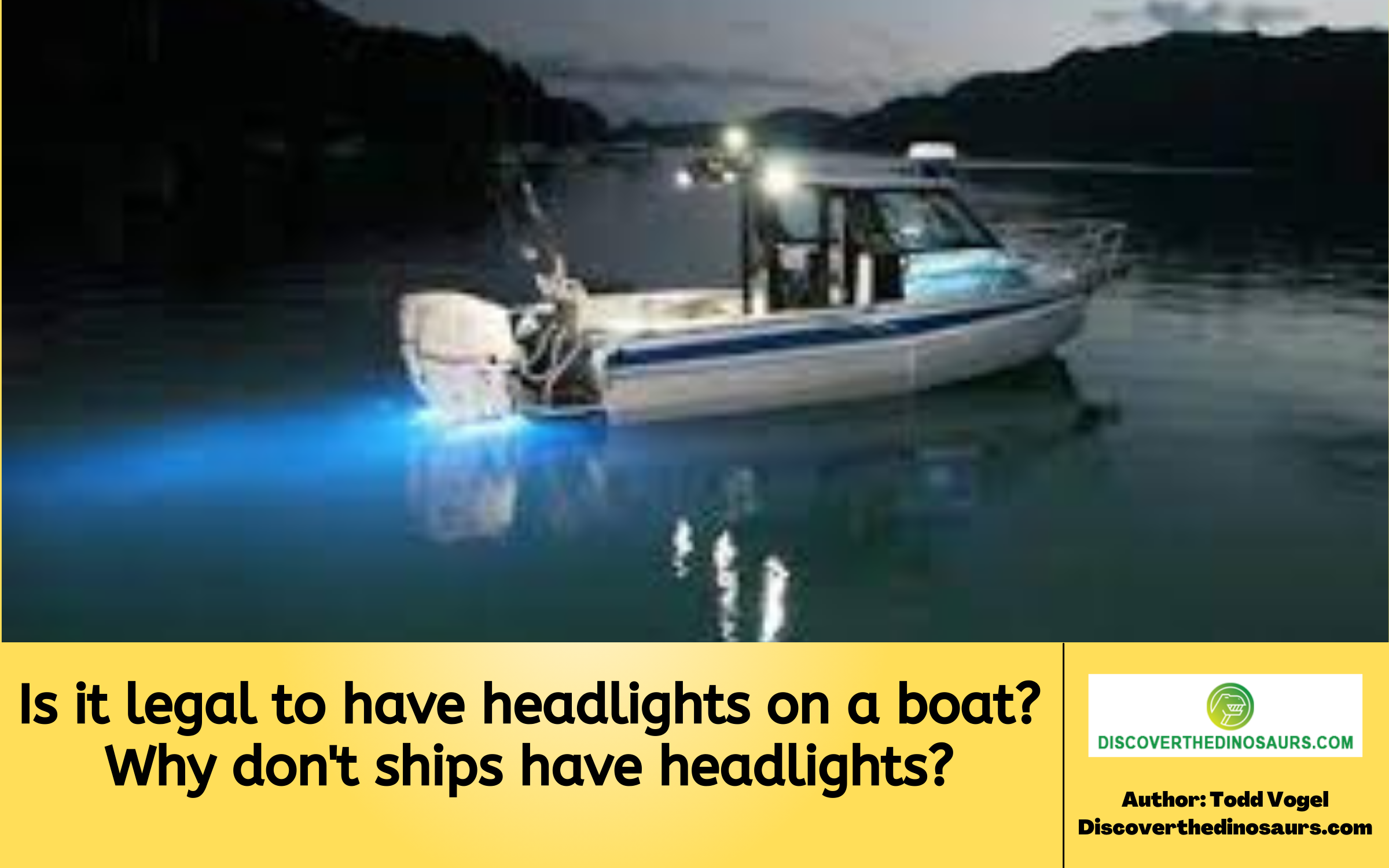
Is it legal to have headlights on a boat? Why don’t ships have headlights?
Is it permitted to equip a boat with headlights in the United States?
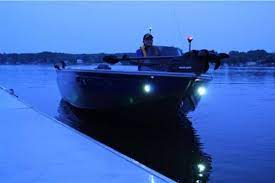
Is it permitted to equip a boat with headlights in the United States?
Yes, it is legal to have headlights on a boat in the United States. There are no federal regulations prohibiting the use of headlights on boats, and many states do not have any specific laws regarding this matter.
However, some states do place restrictions on the use of boat headlights, so it is important to check the rules and regulations in your particular state before using them.
Additionally, even if there are no state laws prohibiting the use of boat headlights, you should always use caution when operating your vessel at night and be sure to follow all safe boating practices.
Why Don’t Boats Have Headlights to Guide Other Boaters?
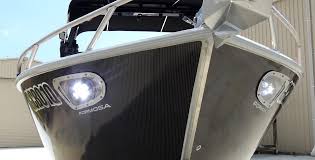
Why Don’t Boats Have Headlights to Guide Other Boaters?
One common misconception is that boats are not required to have headlights because they do not travel on roads. However, this is not the case. While boats are not required to have headlights by federal law, many states actually do require vessels to be equipped with working navigation lights when operating at night.
These lights help other boaters see your vessel and avoid collisions. So, if your state requires navigation lights, you will likely also be required to have a headlight on your boat.
While there are no federal regulations prohibiting the use of headlights on boats, many states do place restrictions on their use.
Some states specifically prohibit the use of boat headlights while others allow them but placed restrictions on their use. For example, in California, it is legal to use headlights on a boat but they may only be used when approaching or passing another vessel, in restricted visibility, or when necessary to avoid collision.
In Florida, boat headlights may only be used from sunset to sunrise.
Because state laws regarding the use of boat headlights vary, it is important to check the rules and regulations in your particular state before using them.
Additionally, even if there are no state laws prohibiting the use of boat headlights, you should always use caution when operating your vessel at night and be sure to follow all safe boating practices.
There are a handful of other explanations for why boats do not have headlights
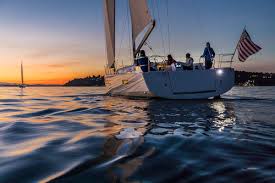
There are a handful of other explanations for why boats do not have headlights
Another common misconception is that boats do not have headlights because they are not required to have them by law. However, as mentioned above, while there are no federal regulations prohibiting the use of headlights on boats, many states actually do require vessels to be equipped with working navigation lights when operating at night.
So, if your state requires navigation lights, you will likely also be required to have a headlight on your boat.
Similarly, some people believe that boats do not have headlights because they do not travel on roads. However, this is not the case either. While boats are not required to have headlights by federal law, many states actually do require vessels to be equipped with working navigation lights when operating at night.
These lights help other boaters see your vessel and avoid collisions. So, if your state requires navigation lights, you will likely also be required to have a headlight on your boat.
Another explanation for why boats do not have headlights is that they are not generally necessary when operating during the daytime. While it is true that most boats do not need headlights when operating during the day, there are some circumstances where they can be helpful.
For example, if you are operating in restricted visibility or in an area with lots of other boats, having headlights can help you be seen by other boaters and avoid collisions.
Finally, some people believe that boats do not have headlights because they are not as efficient as car headlights. However, this is not necessarily true. While boat headlights are not as widely used as car headlights, they can be just as effective when used properly.
So, while there are a few reasons why boats do not have headlights, the most likely explanation is that they are simply not required by law. However, if you will be operating your vessel at night or in restricted visibility, it is important to check the rules and regulations in your particular state to see if you are required to have a headlight on your boat.
Additionally, even if there are no state laws prohibiting the use of boat headlights, you should always use caution when operating your vessel at night and be sure to follow all safe boating practices.
Are Headlights on Boats Allowed to Be Used?
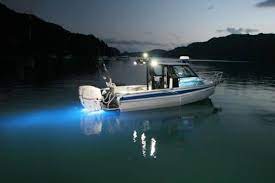
Are Headlights on Boats Allowed to Be Used?
Some states specifically prohibit the use of boat headlights while others allow them but placed restrictions on their use. For example, in California, it is legal to use headlights on a boat but they may only be used when approaching or passing another vessel, in restricted visibility, or when necessary to avoid collision.
In Florida, boat headlights may only be used from sunset to sunrise.
Because state laws regarding the use of boat headlights vary, it is important to check the rules and regulations in your particular state before using them.
Additionally, even if there are no state laws prohibiting the use of boat headlights, you should always use caution when operating your vessel at night and be sure to follow all safe boating practices.
5 Best Boat Headlights
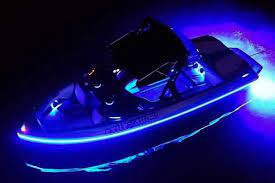
5 Best Boat Headlights
Nicoko Curved Lights in White and Amber
These Nicoko Curved Lights in White and Amber are designed to give your boat a modern look while providing maximum visibility on the water. The lights are made of durable ABS plastic and have a white LED light with an amber LED accent light. They can be mounted on the hull or deck of your boat and come with all the necessary hardware for installation.
Autosaver Fog Headlights
These Autosaver Fog Headlights are designed for use in foggy conditions and are made of durable ABS plastic. The lights have a white LED light with an amber LED accent light. They can be mounted on the hull or deck of your boat and come with all the necessary hardware for installation.
Samlight Fog Lights
These Samlight Fog Lights are designed for use in foggy conditions and are made of durable ABS plastic. The lights have a white LED light with an amber LED accent light. They can be mounted on the hull or deck of your boat and come with all the necessary hardware for installation.
Fog Headlights and Driving Lights with Samman LED Technology
These Fog Headlights and Driving Lights with Samman LED Technology are designed for use in foggy conditions and are made of durable ABS plastic. The lights have a white LED light with an amber LED accent light. They can be mounted on the hull or deck of your boat and come with all the necessary hardware for installation.
Sufemotec LED Driving Work Lights (Available in Three Colors)
These Sufemotec LED Driving Work Lights are designed for use in foggy conditions and are made of durable ABS plastic. The lights have a white LED light with an amber LED accent light. They can be mounted on the hull or deck of your boat and come with all the necessary hardware for installation.
Headlights and Navigational Lights for the Boat
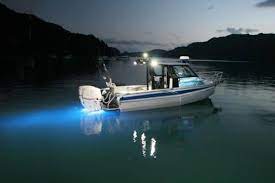
Headlights and Navigational Lights for the Boat
Guidelines for Safe Navigation When Boating at Night
The increased visibility can be achieved by reorganizing and adjusting your lighting:
The positioning of your lights and the amount of brightness they emit can either improve or worsen your visibility. It is possible for you and other boaters to have decreased visibility if your boat has excessively bright lighting both inside and outside of the vessel.
Consider how the sudden, intense glare of the headlights of a vehicle traveling in the opposite direction on the road might momentarily impair your vision when you are behind the wheel. When going boating, it is exactly the same. Your too bright lights have the potential to “blind” not just yourself but also other people.
Therefore, governmental authorities have recognized the need to impose regulations on the use of lights by boats operating at night. In the majority of states, the use of blue lights is a violation of the law, however the specific regulations can differ depending on the type of boat. You need to get in touch with the administration of the area in which you are currently located in order to determine whether or not this rule applies to you. Find out more about the local laws and regulations that apply to your situation.
While anchored or moving through Wisconsinn waters, the usage of blue accent lights is illegal. The state has restricted the use of blue-colored lights to just the state’s patrol boats.
The state and local governments in Arizona have made it illegal for boats to have blue lights, with the exception of those used by law enforcement.
The United States Department of Homeland Security emphasized that boaters should install lights that “do not impair the visibility or distinctive character of approved and properly placed navigation lights.” These lights should not be confused with navigational lights and should not be confused with other types of lights. Additionally, you are responsible for making certain that your lights “do not interfere with the operator’s ability to maintain a proper lookout.”
It is strongly recommended by the United States Coast Guard that you should not buy lights that do not satisfy the required criteria.
Proceed With Caution:
Visions at night often become muddled and difficult to interpret. The reflection of the light on the water makes it more difficult to see both inside and outside of the boat. As a result, you will need to maneuver slowly while also reducing your speed. Take careful note of your environment unless you are in the middle of a big ocean by yourself, in which case you can ignore everything.
Keep your distance, at least a few miles away, because it is quite likely that the fishing vessel off in the distance has its net spread out over a broad region.
Avoid using colored blue lights, lights or headlights that are too bright, and only make use of the legally needed navigational lights.
The United States Coast Guard has a policy that forbids vessels from using superfluous lighting, particularly headlights, if doing so makes navigation more difficult.
Requirements for All Lights Used for Navigation
The United States Coast Guard has established criteria for the usage of lights, which vary based on the length, purpose, and kind of your boat. Recreational boaters almost always operate vessels that are shorter than 39 feet in length. A stern light, a masthead light, and sidelights are essential components of this particular model of boat.
You should position a white stern light so that it is as close to the stern as feasible, while you are required to position the white masthead light at the centerline of the boat, which is over the bow and stern. On the other hand, you are required to install a green light on the starboard side and a red light on the port side of the vessel.
This white, green, and red navigation system for boats has also been adopted by planes in order to enhance the visibility of both types of vehicles while flying through the night sky.
The objective is to improve visibility as much as possible so that other vessels can see you and you can see them as well, in order to prevent accidents or collisions that could result in loss of life.
In addition, if you intend to use your boat for recreational reasons, the lights on it need to be compliant with the standards set forth by the American Boat and Yacht Council (ABYC) chapter that serves your state or region.
Necessary Lights to Have While on the Dock
In addition to these boat lights, you are responsible for ensuring that your vessel does not have any dazzling colored lights that would be in violation of the regulations in effect in your region. The following are some general guidelines on the lights that are required for your boat.
LED lighting for boats
The anchor light in the front of the boat needs to be white and should be seen from a distance of two miles.
When anchored in a fairway, anchorage, or a tight channel, where other boats typically navigate, power-driven boats that are shorter than 23 feet (seven meters) in length are required to illuminate their anchors with navigational lights.
Anchor lights are needed to be displayed on power-driven boats that are more than 23 to 66 feet in length, with the exception of when the boats are docked in a particular area that has been designated by a government authority.
If You Break the Rules, What Are the Consequences?
There are monetary penalties that correspond to each infraction. Your lighting violation might result in a fine anywhere from $100 to $300, depending on the kind and degree of the infraction you committed.
What Are the Most Important Safety Features That a Boat Needs to Have?
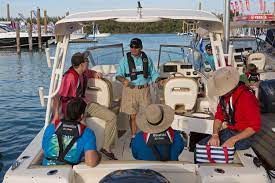
What Are the Most Important Safety Features That a Boat Needs to Have?
In addition to having the proper lighting, all boats should be equipped with certain safety features in order to minimize the risk of accidents and injuries. Some of the most important safety features that a boat needs to have include:
• A fire extinguisher: This is one of the most important safety features because it can help to put out a fire before it has a chance to spread and cause more damage.
• A life jacket: Everyone on board should have a life jacket that fits properly. In the event of an accident, a life jacket can help to keep someone afloat until they are rescued.
• A first-aid kit: This is another essential item because it can be used to treat minor injuries until medical help arrives.
• A flares: Flares can be used to signal for help in the event that your boat becomes stranded.
• A whistle: A whistle can be used to attract attention and to signal for help.
Ensuring that your boat is equipped with these safety features can help to make sure that you and your passengers are safe while out on the water.
How Can One Avoid Getting into an Accident While Boating?
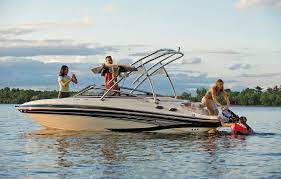
How Can One Avoid Getting into an Accident While Boating?
There are a few things that you can do in order to avoid getting into an accident while boating.
First, it is important to always wear a life jacket.
Secondly, you should avoid drinking alcohol while operating a boat.
Third, you should make sure that your boat is properly lit and that all of the required safety features are on board.
Lastly, you should be aware of your surroundings and know how to safely navigate in different weather conditions. By following these safety tips, you can help to reduce the risk of getting into an accident while out on the water.
F.A.Q about “Is it legal to have headlights on a boat”
Do boats have their own sets of headlights?
There are self-adjusting headlamps that can be used as headlights and aim in different directions; however, they do not project to the front of the vehicle in the same way that a car’s headlights would. Because of this, boats have to be equipped with nav lights (sometimes spelled navigation lights) so that they can be seen from above when it is nighttime. They emit a significantly lower amount of light in comparison to an ordinary pair of automobile headlights.
How can I improve my night vision so that I can boat safely?
In order to see better at night, it is recommended that you:
• Wear clothing that is not white or black so that you will be more visible to others.
• Use reflective tape on your boat so that it can be seen more easily.
• Install LED lights on your boat. These types of lights are very bright and will help you to see in low-light conditions.
• Make sure to clean your boat’s windshield so that there is no dirt or grime obscuring your vision.
On boats, is it against the law to have light bars?
In most cases, yes. Having a light bar on a boat is typically against the law because they can be very disruptive to other boats and people who are out on the water. If you must have a light bar, make sure that it is mounted in a way that will not shine into other people’s eyes or cause them to be blinded by the light.
Do lights have to be used on boats while the sun is out?
No, lights are not required to be used during the daytime; however, it is always a good idea to have them turned on so that you can be seen more easily by other boats and people.
Is it possible to install lights on a boat?
LEDs and a lighting controller can be used to adorn your boat in a variety of ways. It is possible to make the lights pulse to the beat of the music playing through the speakers, cycle through a variety of hues, or light up your boat with a single accent color for a calming glow.
Do boats have functioning headlights?
There is a natural propensity for a person who is operating a boat at night to want to use a searchlight or spotlight, just as there is a natural desire for a person operating a car at night to want to use headlights. However, headlights do not function properly when used on water.
One reason for this is that you are not on a road or highway, where oncoming traffic would be coming from one of several predetermined directions.
Why don’t ships have lights on the front of them?
The difference is that these lights are referred to as running lights, and they make it feasible for other ships to see them from a greater distance. Instead of illuminating impending objects, it lets them see you. This is in contrast to the previous ability, which illuminated oncoming objects.
Is it possible to install spotlights on a boat?
Putting a Spotlight in a Boat That You Own
If you are dead set on using a top-mounted light, you should temporarily wire the light and have a helper keep it on your top while the boat is still during the night. This will allow you to determine whether or not this will be a problem for you. It is best to mount the light in the front position. Just remember to use caution with regard to spotlight rail mounting.
Do you mind if I decorate my boat with Christmas lights?
You can utilize an inverter that is driven by a boat battery to power AC-powered lights; however, you should use LEDs to keep the amount of electricity drawn to a minimum. You can also get power by using a marine genset that has been installed correctly (be sure to get more fuel during the day), but you shouldn’t use a portable generator.
Conclusion
While it is not required by law to have headlights on a boat, it is highly recommended for the safety of all boaters. Boat headlights allow you to see and be seen in low-light or nighttime conditions, making it easier to navigate your vessel and avoid potential accidents.
If you are planning on spending any time on the water after dark, make sure to equip your boat with a set of quality headlights.
This discoverthedinosaurs.com post will show the information about “Is it legal to have headlights on a boat”
- why don’t ships have headlights
- how do cruise ships see at night
- boat headlights
- boat spotlight
- boat docking lights

